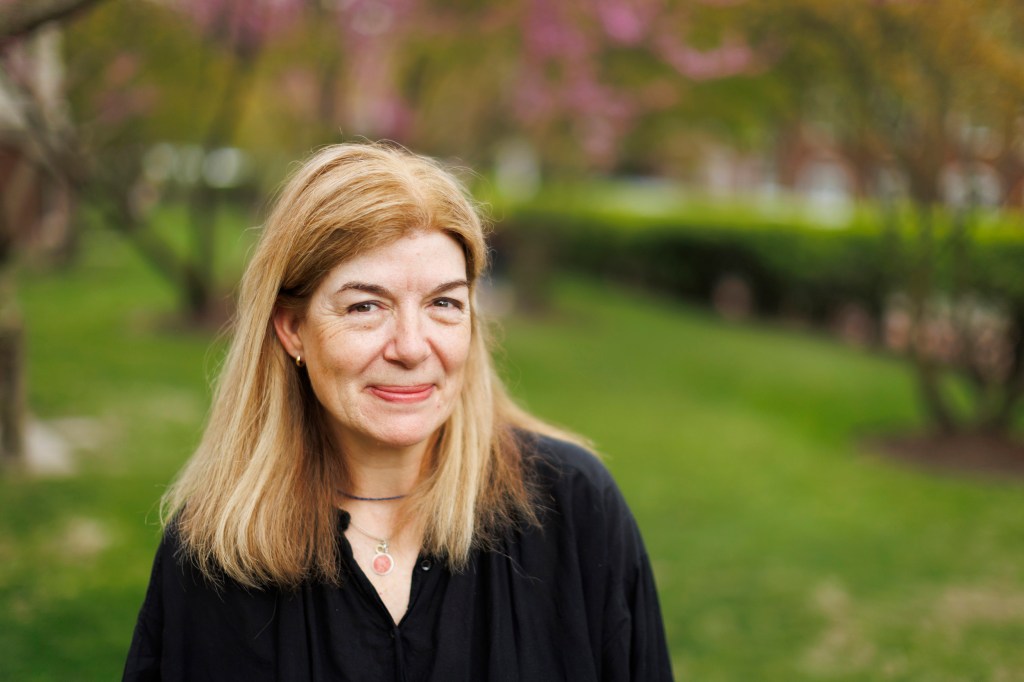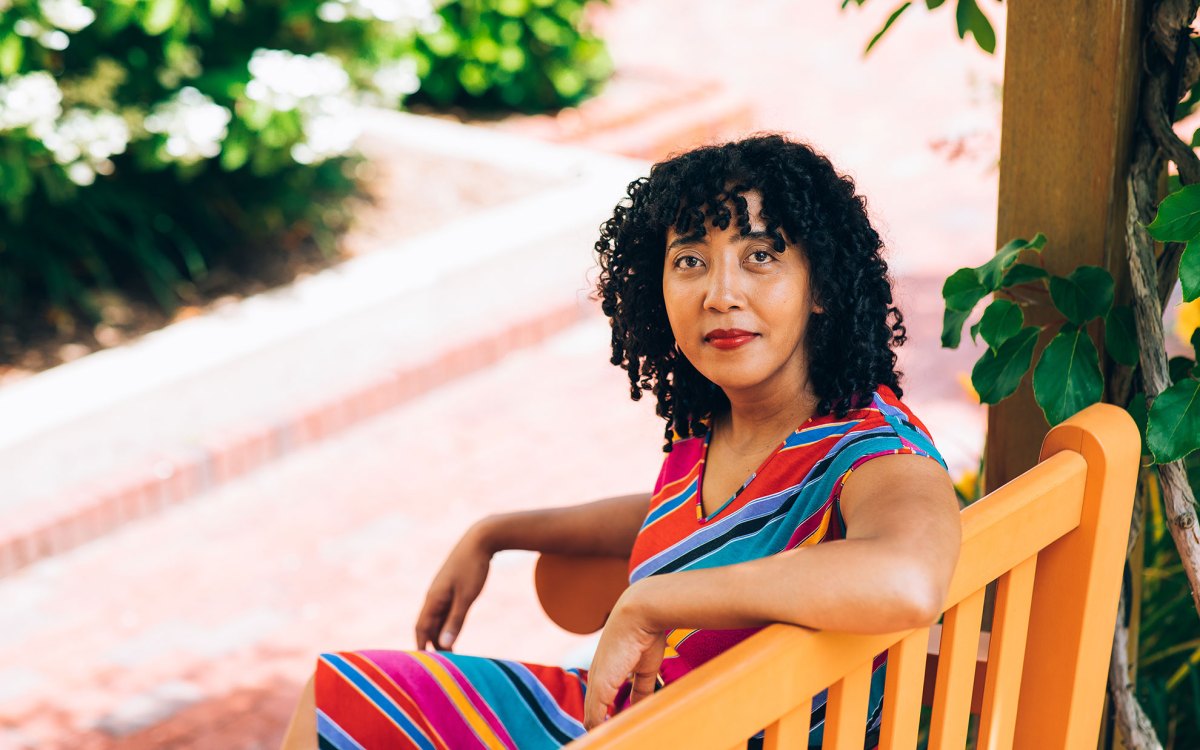
French officer rushes wife, young children out of Salonica as Nazis near
In novel rooted in family lore, Claire Messud trails three generations of family with Algerian roots, lives shaped by displacement, war, social and political upheaval
Excerpted from “This Strange Eventful History” by Claire Messud, Joseph Y. Bae and Janice Lee Senior Lecturer on Fiction. Used with permission of the publisher, W. W. Norton & Company, Inc. All rights reserved.
French naval attaché Gaston Cassar should never have brought his family from Beirut to his posting in Salonica, but he hadn’t been able to imagine living without them. Lucienne had seemed unafraid, and together they’d chosen the villa to rent, amazed by the space and amenities they could afford, charmed by their gracious landlord, Monsieur Hernandez, a prosperous Jewish merchant who lived with his wife in a mansion not far away. For months, all through the winter, in spite of the faraway war, Gaston had loved walking home each evening along the broad boulevard, away from the glittering seafront to the house where the children played in the afternoons in the shady, fragrant garden while Tata Jeanne, knitting, kept an eye from the open window.
Daily he’d looked forward, as to gifts, to the monkey-limbed leaping embrace of little Denise, her scrawny legs tucked around his waist when he lifted her, her hot, delicate little hands patting his cheeks between kisses, her fine straw-blond hair escaping from its braids to dance around her skull, catching the light. François hovered always shyly behind his sister, his glances hopeful but uncertain: he so powerfully longed for his father’s approval. When he had a good result at school to announce, he drew near, smiling outright, and brushed the dark swath of hair from his eyes. Gaston wanted so much of that boy, for that boy, his son and heir, his own future: already François understood it, and feared disappointing his father; and that fear alone disappointed Gaston. Though even that disappointment was a kind of love.
Gaston loved above all, and looked forward to especially, the moment when he would see Lucienne, his beloved wife, often from behind, either at her desk or standing by the dining table or even at the sink in the kitchen: he would admire the shape of her back, the line of her nape, and would thrill to approach her and rest his hand on the small of her spine, feeling the rise of her buttocks only slightly, the promise of Eros beneath the careful layers of cretonne and silk, the slight swish of the fabric if he moved a finger …
But even then, through those months from September to May, he’d felt dread, in waves. A growing sickness of it. News of the wider world, only ever bleaker, penetrated their enclave: not just Germany’s relentless advances, but also a growing apprehension of the hopeless unpreparedness of the French command. His superior in Beirut, Cherrière, told him in the early spring that the leadership in Paris spoke frankly of the need to compromise if the Germans continued to advance. Even then, the French army anticipated defeat. Gaston’s heart beat even in his fingertips at the memory of Cherrière’s scratched voice, of the weariness, almost blurriness, of his usually tough demeanor — before the French war had even begun. By mid-May, when Gaston received the Romanian consul’s invitation, the news from points north had grown dire: from the initial attack on Belgium and Holland, the Germans had taken only four days to reach northern France and by May 14, they were entrenched there, their sights on Paris.

Claire Messud.
File photo by Stephanie Mitchell/Harvard Staff Photographer
From early May onward, Gaston focused his dread and distress on the fate of his family. Why, he kept wondering, had he brought them with him to Salonica, instead of parking them in Algiers with his brother or his aunts? The children as well as Lucienne’s invalid sister, Tata Jeanne, who was prone to unforeseeable seizures of daunting severity. He and Lucienne belonged in Algiers; they loved the beautiful city where they’d both grown up, where their parents and grandparents had grown up. They’d been shaped by it, felt it part of them, and though they had nowhere there to live (the navy had kept them on the move since they married), Algiers was the home to which they’d always planned, eventually, to return. If he’d been willing to be separated from his beloved and their children, Gaston could have settled them properly in an apartment there before the world lurched into crisis. But he’d believed he could not live without them — without her, Lucienne. And who could have foreseen, the previous autumn, how quickly the Germans would advance across Europe?
From the first week of May, it was clear that Lucienne, Tata Jeanne, and the children needed to get back to Algeria as quickly as possible, traveling overland by train to France, as far as Marseille, and then boarding the ferry for home. Italy, under Mussolini, prepared to enter the war in alliance with Germany any day; and when that happened, travel between Greece and France would become impossible. The women and children needed to evacuate posthaste.
Gaston, too, wanted to get out of Salonica. Even knowing that France was likely to capitulate, he wanted to be part of the struggle, to fight honorably and, if need be, to die for his country. And at the same time, he wanted nothing more than to board the train with his wife, to feel her body pressed against his side when she tucked her dark head under his chin, and to know that they would be together, inseparable, always.
Lucienne, Tata Jeanne, and the children had departed from the train station near the commercial port late on the morning of May 21. The day was hot even before noon, and in the taxi — crossing town past the vast Jewish cemetery, with its white marble headstones glittering, past the White Tower, that stolid cylindrical blockhouse with its crenellated cap, along the seafront of shimmering, endlessly mobile wavelets clamoring at the sea wall, and on the horizon, like the eye of eternity, Mount Olympus, home of the gods, wreathed in a dispassionate haze — even as Gaston kept one eye on all these things, he gazed also at his wife, Lucienne, trying to memorize her in every detail. She sat quietly beside him, her cheeks flushed, her short forehead beaded from the exertions of departure, her hands in her lap folded around the wrinkled linen handkerchief with which she dabbed, periodically, at her temples or at the corners of her eyes. They traveled alone in one taxi; Tata Jeanne and the children were in another, just behind them. Because of this, in spite of the driver, he reached to stroke her hair, her cheek.
“Aïni,” he said, almost trembling. And then nothing more. All his emotion in that private name. They both knew this was the moment for their real farewell, rather than in the chaos of the station with the children and their aunt, broad-hipped, thick-calved Jeanne all but blind behind her glasses, almost like a third child.
“Have faith,” his wife said, reaching to take his hand between hers upon her lap, an intimacy the driver could not see in his mirror. They both knew that everything from this moment forward was uncertain: when or even whether they would be reunited; where or how a reunion might take place; what might lie in store for them and the children — so young, the children, all promise still. Even their continued existence felt uncertain, and the distance from Salonica to Algiers loomed enormous and perilous, an odyssey.
The station’s bustle was in fact a gift, panic manifest in the pushing crowds, the insistent echoing Tannoy, the belch of the trains’ engines as they clattered down the platform behind the porter, a fat man with voluminous mustaches, who wore his cap on the back of his head, brim skyward, to jaunty effect. The surrounding madness settled Gaston, made him calmer. This, he knew how to do: to project the necessary ease and confidence that was — he so wanted to teach this to his son — the noble falsehood of a leader. He stood in the doorway of their carriage, once the luggage had been stowed (How could they have so much luggage? How would they manage, changing trains? How would they manage at all?): one by one they hugged and kissed him, Denise and Tata Jeanne tearful; François in the guise of petit homme, knowing what his father wanted shook Gaston’s hand and whispered formally, “I’ll take care of everyone, I promise.”
And Lucienne: those eyes that glittered like the Mediterranean. Her smile was sorrowful and loving, and even when he stood outside the train, on the quai, and the children and Lucienne filled the window with their waving, she smiled at him, she smiled for him, the one person who saw him fully and genuinely, to the last she smiled, until he couldn’t make them out any longer.
Copyright © 2024 by Claire Messud




